The tough balancing act Victoria’s chief commissioner Shane Patton walks every day
He’s one of the biggest critics of top cop Shane Patton. Now, Herald Sun columnist Steve Price goes head-to-head with the chief commissioner about being too close to the government, taking part in gay pride marches and teenagers who no longer fear police.
Victoria
Don't miss out on the headlines from Victoria. Followed categories will be added to My News.
Victoria’s top cop chief commissioner Shane Patton hates being called woke.
Last time I wrote about the Commissioner in my Saturday column my talented colleague Mark Knight drew him fast asleep as teenage home invaders broke into a neighbour’s home.
He was cradling a teddy-bear wearing the rainbow colours and wearing a badge PC Patton.
It was back in March a few weeks after a police contingent marching in St Kilda’s Gay Pride annual event were pelted with paint and confronted by up to 50 protesters angry at their involvement.
Shane Patton’s support staff, who have huge regard for their boss, presented my column to their “boss” with Knight’s cartoon removed.
It wasn’t long before mates of Patton were calling up laughing and winding him up about being called politically correct and woke.
After spending more than an hour with Victoria’s chief cop this week it struck me just what a tough balancing act Patton has.
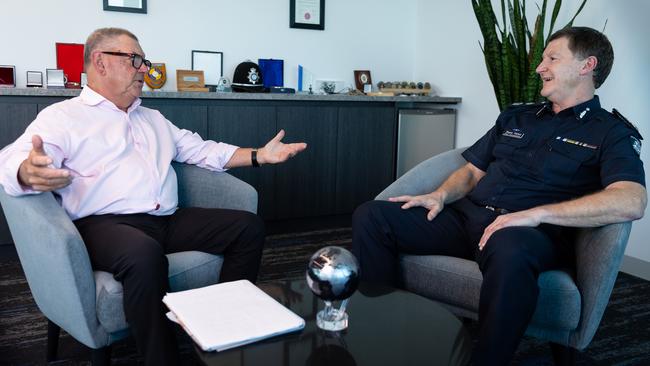
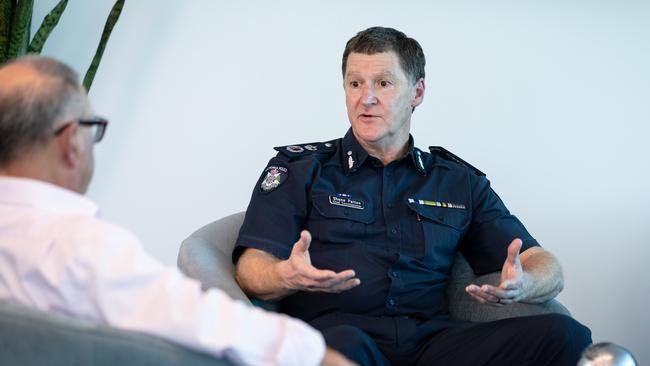
This week was a perfect example of how finding that balance is such a tough ask with feral pro-Palestinian protesters — infiltrated by radical professional agitators — defied demands they exit university campuses.
Shane Patton took over the top job in the middle of Covid, had to deal with former Premier Daniel Andrews and chief health officer Brett Sutton, was forced to make the tough call setting his own officers on fellow Victorians protesting illegally for four days, even endorsing the use of tear gas, rubber pellets and baton charges.
During our time together this week he defended those actions by making the point he and I were not there, and his men and women were being pelted with various missiles by an ugly crowd.
That’s Patton, fiercely loyal to the almost 22,000 police under his command but at the same time hamstrung by political policies coming out of Spring Street.
It’s an almost impossible job to do without copping some critics – myself included obviously – and Patton can’t keep the public happy while at the same time keeping an eye to his political masters and media critics.
With stretched resources he is trying to get on top of a youth crime wave fuelled by social media and bail happy magistrates letting kids back onto the streets.
He has the tobacco wars to deal with, an explosion in domestic violence and the very real threat of renewed activity of terrorism.
Ethnic crime is another touchstone with immigration numbers swelling Melbourne’s population toward the biggest city in Australia.
Sipping from an Essendon footy club mug and laughing about tearing his hamstring off the bone playing table tennis, it’s hard not to feel that having Patton in charge during an emergency would be a good thing.
Chief, thanks for seeing a critic and good luck keeping us all safe.
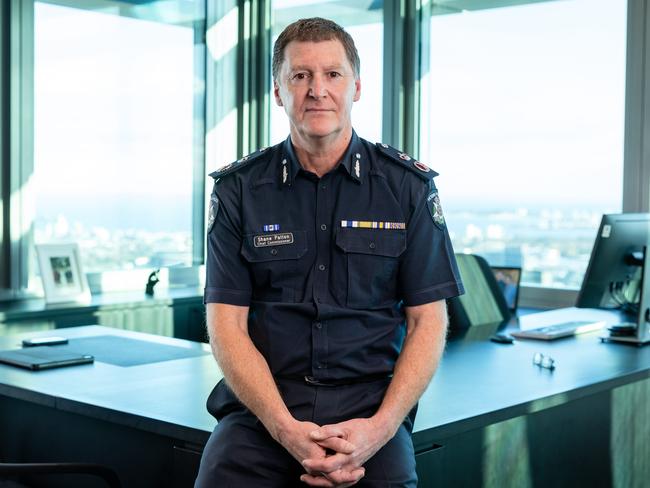
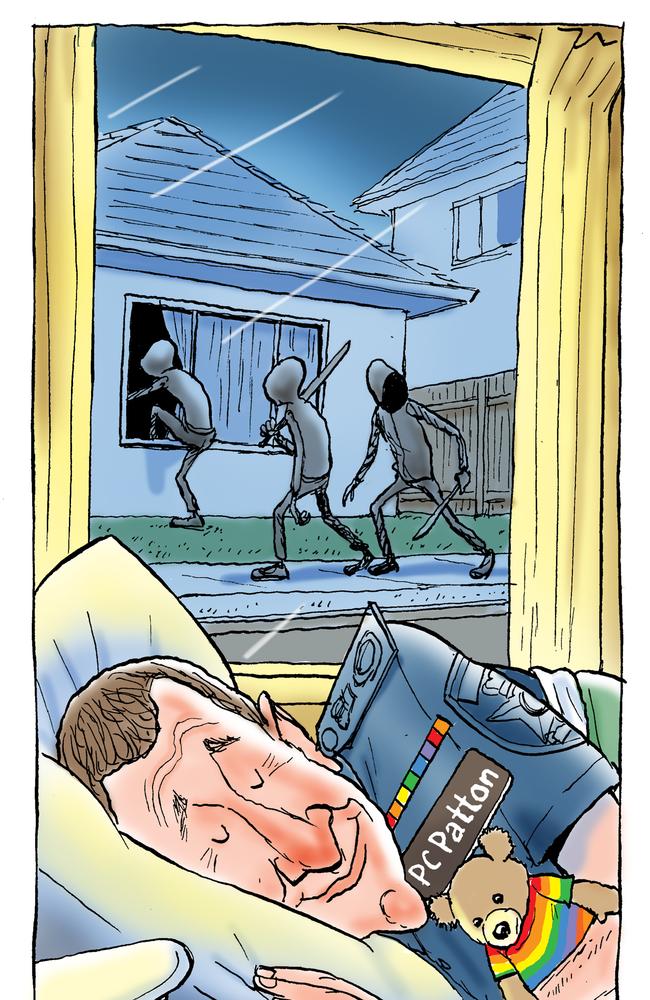
Steve Price: Commissioner Shane Patton, thanks for having us. Very nice to see you.
Shane Patton: Yeah, thanks.
Steve Price: I wrote a critical column in March and I accused you of being politically correct and too close to government. Was I wrong?
Shane Patton: I’m certainly not too close to government, from my point of view. Of course, we’ve got to introduce and implement government policies, as we did over Covid, and as we still do when they set their policies. But I actually engage in a lot of healthy debate, discussions and interactions with government over what we’d like to see. I put forward our views on a range of reforms and things like that. Government don’t always agree with us, and so I think there’s quite a quite a healthy tension, which should always exist between a policing organisation and the government. Was the other thing am I politically correct? Gee, if you asked any of anyone who knows me, — and I’ll have to reflect on that if that’s the perception — I don’t think it could be further from the truth.
Steve Price: I’ll tell you why I think it’s a perception. When I wrote that column, you’d just marched in that gay pride march in St. Kilda. One of your officers, or some of your officers were abused, you had paint thrown at you. I just wonder why you feel as the most senior police officer that you have to involve yourself in something like that.
Shane Patton: We’ve been doing it for over 20 years now. And if you think back, I think Christine Nixon who started it for us. If you think back, our relationship with the LGBTQIA+ community was horrendous. We were very biased. The way we policed against them was biased. We also enforced laws which now people, looking back, go, it was wrong.
Steve Price: So you’ll go back?
Shane Patton: Yeah, absolutely. Unless they stop us marching, I’ll definitely go back. I think it’s important to continue on (working with) what was a community that was discriminated against, marginalised, over policed, and for them to have the confidence in us.
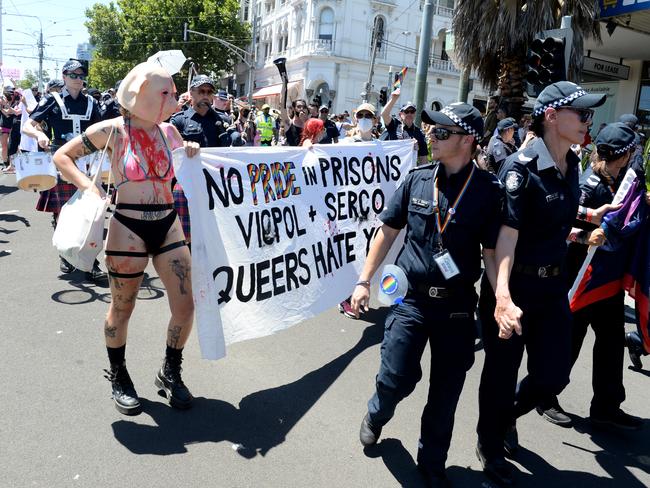
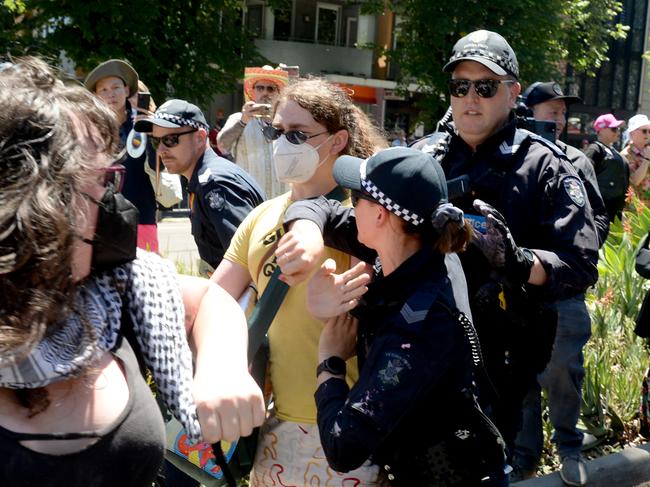
Steve Price: You took over the force in July 2020. Not great timing. It was the start of Covid. I went back and had a look. You started on June 30. We just had gone into lockdown number two, this is probably giving you PTSD reminding you that Melburnians had four reasons to leave home only, and your members had to enforce those lockdown rules. In hindsight, were those rules too tough?
Shane Patton: The CHO made the rules. Were they too tough? Yeah, perhaps. Would we do the same things again? Probably not. Did we get it wrong sometimes? Yeah. Did we over police sometimes? Yeah. But everything’s easy in hindsight. Can you remember the fear? Oh sorry, I shouldn’t be asking the questions.
Steve Price: No, you can ask me the question because yeah, I do remember it. But hindsight, as you say, is it’s easy to look back in hindsight, but we need to learn from that, don’t we?
Shane Patton: Oh, absolutely. Yeah, absolutely. And it’s a cliche, but it’s real. We can’t police without the confidence and the trust and the respect of the public. And there’s no doubt that took a lot of chips off us in roles we had to perform, because we were doing things that we really didn’t want to be doing, but were required to.
Steve Price: Telling people to get off the streets, get out of playgrounds.
Shane Patton: Yep.
Steve Price: Did you at any point go to the Premier and say, “I reckon this stuff’s too tough”?
Shane Patton: We had input in relation to the CHO’s directions and everything like that, and then we operationalised. We were required to implement them, because the CHO was saying this was going to stop the spread of the virus, and will mitigate it at least. But we ended up giving out so many infringements and as you pointed out, we were the most locked down city, certainly in Australia, if not the world, and it certainly did impact on the confidence in policing.
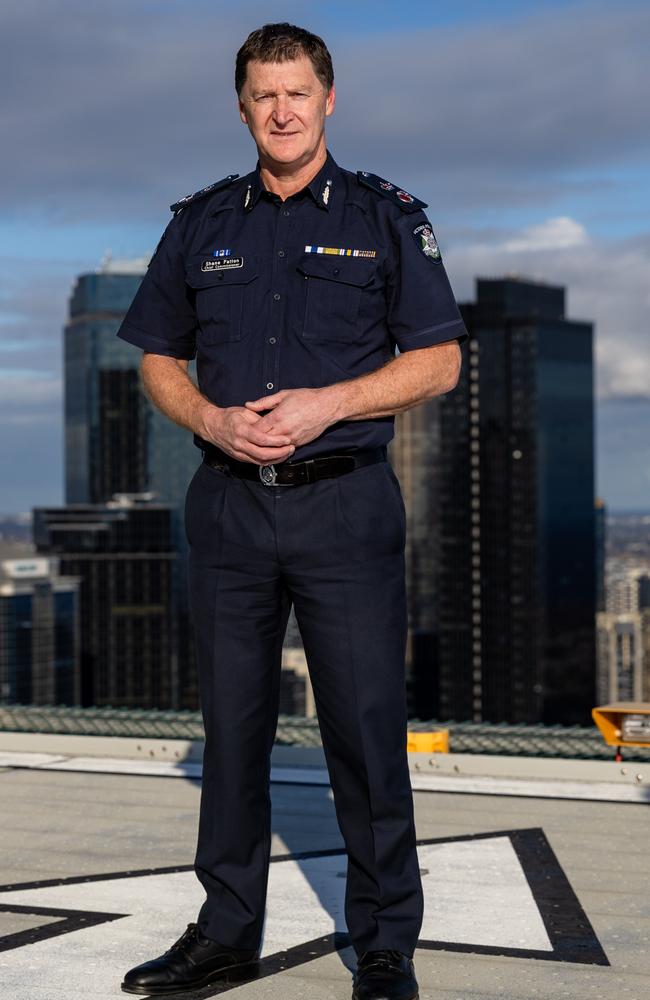
Steve Price: I don’t want to dwell on the past, because there’s so many current issues, but I’ve just got one more question about that. I mean, 14 months into the job, you get four days of anti-lockdown protests. You had your own officers firing pellets and tear gas at Melburnians and using battens on people. As someone who’s lived here for much of their life, I couldn’t believe what I was seeing. Was that an over-reaction?
Shane Patton: No I don’t believe so. They were involved with a very large group, an activist group that was on the ground all day, was confronting them.
Steve Price: Were they too violent?
Shane Patton: Well, I don’t think so. I honestly don’t think so. I wasn’t there, you weren’t there. They started throwing plastic bottles, then glass bottles, and then some other missiles. And this is after a couple of hours, they’d been given a pathway to head out. And so then they used, yeah, they use some foam baton rounds and some gas. Was it a good look? No, not at all.
Steve Price: And then you’ve got this pro-Palestinian group that seems to be able to protest in the streets every day without being moved. How do you weigh these two things up against each other?
Shane Patton: Pretty easily, because they are completely difference scenarios. One is at a time we’ve got a virus that’s spreading and killing people and you’ve got expert medical advice that says, either rightly or wrongly, no one can go out and protest. We have a situation now with protesting, where since the seventh of October, we’ve had numerous predominantly pro-Palestinian protests. They protests are loud, they’re lawful, they’re legal and for all intents and purposes they can go on. We can only police a law as it is, not as the way people might want it to be. The reality is, you can go on demonstrating in Victoria if you do so peacefully.
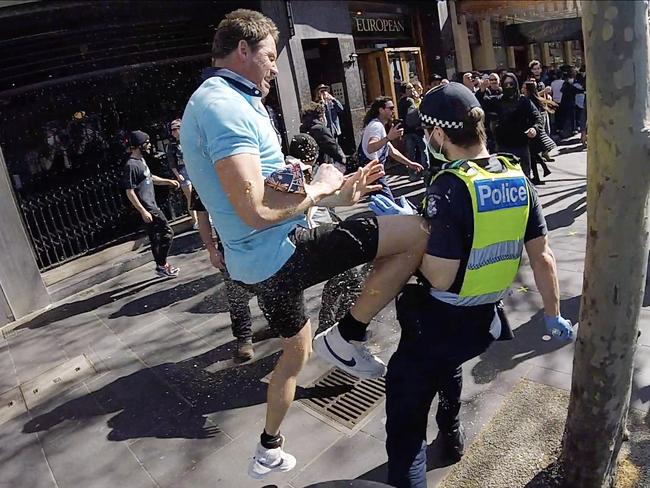
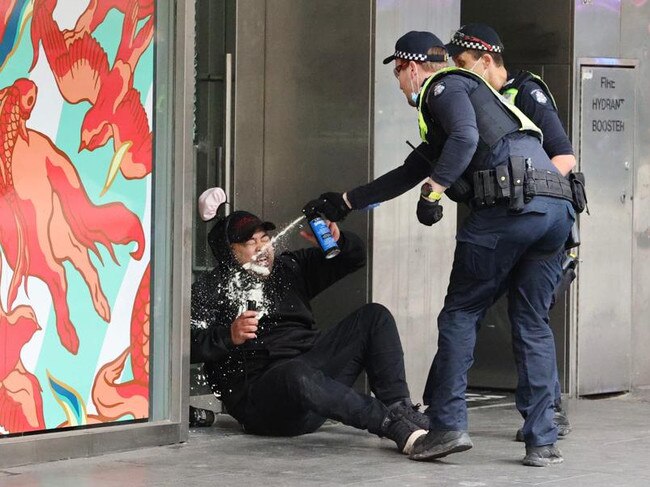
Steve Price: And say whatever you want?
Shane Patton: Not whatever you want. But your speech, if it’s not at a criminal level, a criminal threshold, then you can absolutely. Does that please everyone? No. But that’s our role we’re here to keep the peace. I mean, we have lots of protests for lots of different things and we enforce and when they break the law, as you will have seen, we’ve had lots of activist protests. Westgate Bridge, a range of others where we arrest people and we charge them. People sitting in intersections, we drag as many as we can out and charge them. Happy to.
Steve Price: If I were to nominate the most worrying crime issue, I think for the public, it would have to be aggravated home invasions. And I know it worries you as well. A lot of them carried out by violent teenagers. What do you think’s driving this?
Shane Patton: It’s a whole range of things. And I agree entirely. It’s the most you know, it’s a horrendous crime. That’s why you will have heard us talking about Operation Trinity in the numbers of police were throwing at it. We’re arresting heaps, and that’s not a very good descriptor. But you know, we’ve arrested 3700 people associated with theft of theft of motor cars, because they sneak in and get the keys in the aggravated burglaries. We’ve got a lot of kids who are doing it for notoriety, because were cover around over 95 per cent of those cars. So they’re not doing it because they’re going to sell them or anything. It’s for speeding, they get in the cars, they rip up the freeway, you know 100. And that’s why we’re doing everything we can to stop it. That’s a huge fear of ours that one of these young kids who’ve got no driving experience is going to crash into not only kill themselves and whoever’s in the car, but you know, someone who’s just driving along, minding their own business and is an innocent victim of this. This is why we’re putting so much out there. We’re using the air wing we’re using our highway patrol. We’re using our detectives, we’re using everything we can because it is the most concerning offending we’re seeing.
Steve Price: The age, surprises, everybody. I mean, you’ve got kids as young as 9, 10, 11 years old. We’ve never seen that before ever. And they don’t seem to respect the police and the police uniform. Do you feel that? They’re not scared of you. I was scared of you when I was a kid.
Shane Patton: Yeah.
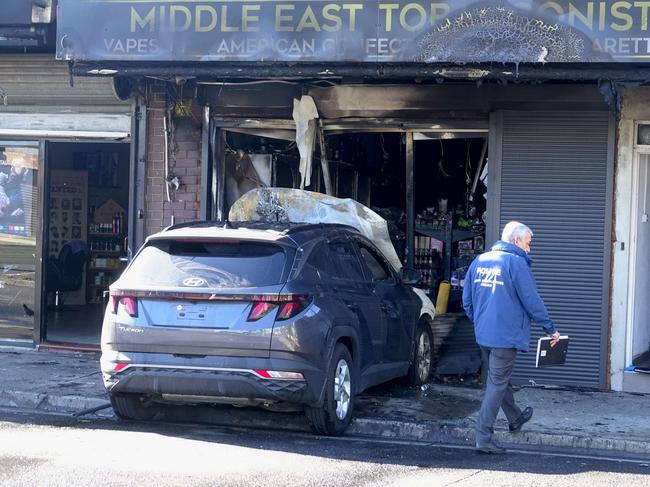
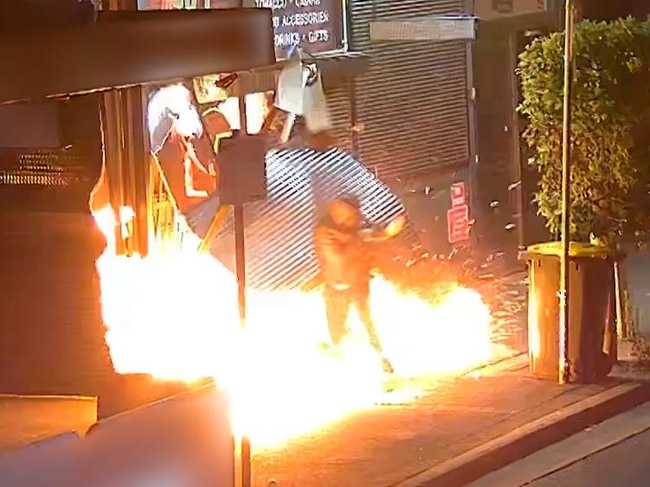
Steve Price: Police, these kids are not scared of the police.
Shane Patton: Now, I don’t know how we get that respect back. We, you know, we as a police organisation, police to the law, we police as strongly as we can. And we hold offenders to account we arrest you know, last year, I think we arrested more people than ever. And we’ll keep arresting them, and doing what we can but how you get that respect back. I don’t think that’s just about policing, though. That’s a whole societal thing. There’s a whole range of issues in there. It’s not just about police, it’s about kids who are disengaged with school, it’s about all of you know, kids who have got family issues, it’s about drugs, it’s about so many different things. Police are one part of it. But and we’ll do our part. But I agree with you. There’s a lack of respect for police.
Steve Price: Our parents used to teach us to respect police, are the parents partly responsible?
Shane Patton: Well, families must be responsible as well. I mean, it’s incumbent on families to make sure that they put values in place for their kids and everything like that.
Steve Price: Surely you can stop a nine-year-old from being out of the house at one o’clock in the morning pinching cars?
Shane Patton: You’d like to think so, but as I said, we’ll do everything we can. I introduced a neighbourhood policing model, which is a nice framework, but the reality is it is about back-to-basics for police. That means we have talked to the community and we’re talking about what you’re talking about. We’re engaging with them, because there’s a hard edge, as well as the softer edge to policing. The schools engagement program, we bought it back, so that we’re in the schools, and we’re trying to teach that respect, and engage with them.
Steve Price: How frustrated are you and your commanders with the court system? I mean, we see a revolving door of bail, we read over and over and over that some of these offenders offended four times, five times, six times and they just keep getting put back out on the street again.
Shane Patton: I know when I talk to police out there and when I’m out there visiting stations and that some of them are frustrated with court outcomes, but I mean, that’s been ongoing since I was a constable. The reality is, we can only look after our side of things and we’ll do that we’ll keep locking up offenders who need to be locked up. We’ll keep remanding them when we can.
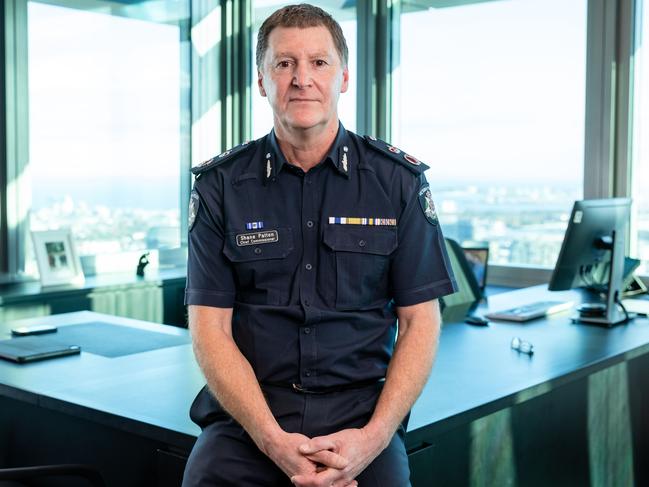
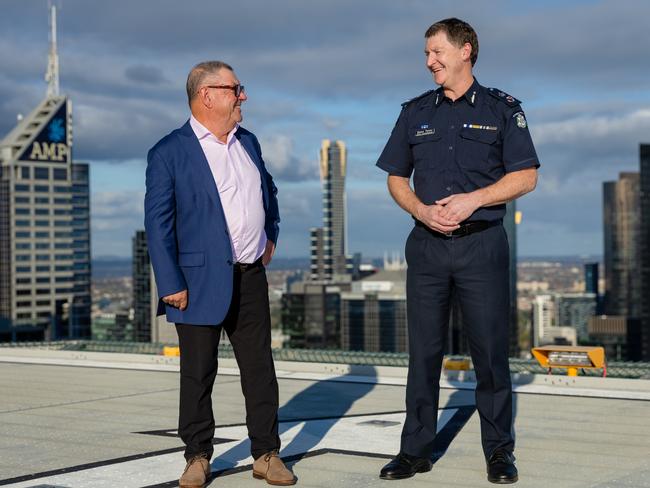
Steve Price: We are having a national conversation about the levels of domestic violence, particularly male violence against women. Are your officers trained to deal with that?
Shane Patton: Yeah. We’re always trying to get better, but Victoria is a world leader in response to family violence. We have 29 Family Violence units across the state. We’ve got 360 dedicated detectives and analysts in there. We’ve got sexual offence and child abuse investigation units, 27 of them with 500 detectives and analysts in there. But then having said that, say the number of incidents we attend every year keep going up. It’s clearly a tsunami of offending that’s occurring out there that we’re trying to deal with. We arrest about 80 family violence offenders a day, one every 18 minutes. That’s great holding to account, but that’s horrendous when you think of that number.
Steve Price: What keeps you awake at night?
Shane Patton: It’s being able to keep the community safe. I just want Victoria, and Melbourne especially, to be a fun place where people come and they can be safe. Every morning I come in and I see the overnight crime report and the fact that we need to be — and we are — doing what we can to stop it. It’s the members’ welfare as well, when you’ve got 800 odd members who we’re still trying to recruit, that puts so much pressure on our members. We know that policing is such a it’s a risky job, but the domino effect that we see from that workload, and the pressures in all of those public mental health responses, family violence responses, crime, policing, protests, a whole range of things that we do. What keeps me awake is how do you keep all of them fit and healthy and wanting to come to work and loving the job and just going out and doing it?
Steve Price: How do you switch off from the job?
Shane Patton: Go to the footy. Have a couple of beers with friends and then watch the Bombers and but also, you know, go out to dinner and that sometimes you switch off sometimes people tell you some advice about how you shouldn’t be doing your job too when you’re out doing that.
Steve Price: But you’re never really off duty are you?
Shane Patton: No, no, no.





